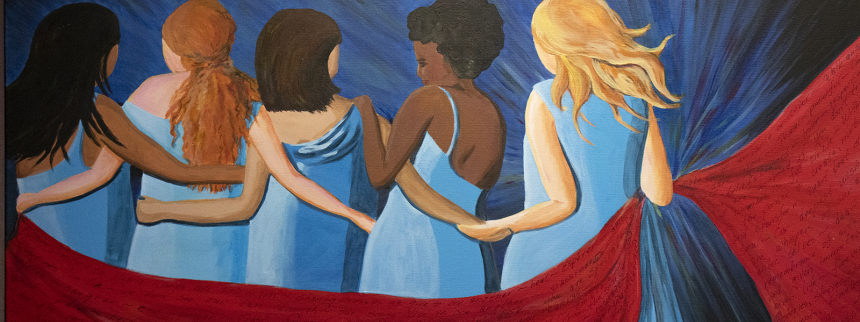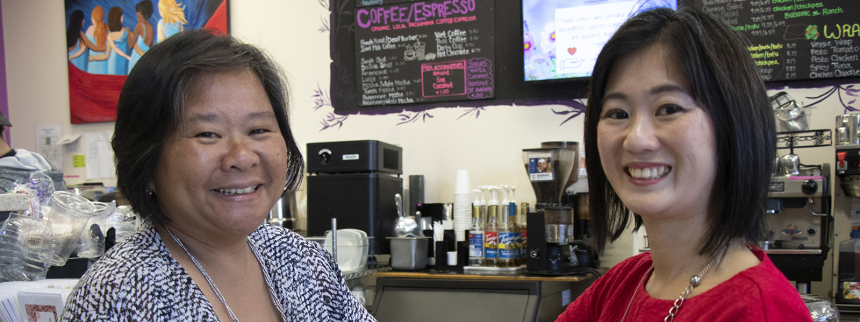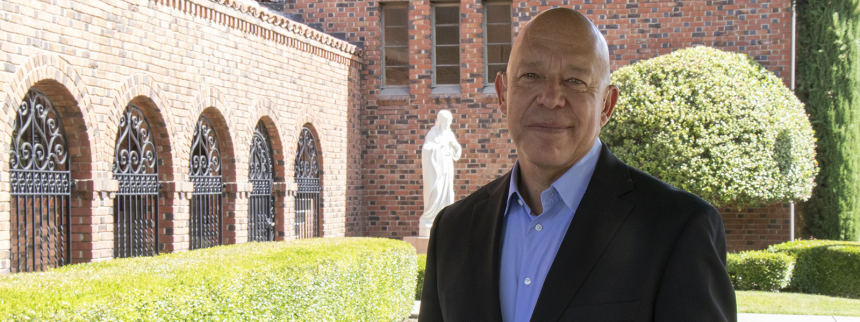
Nilda Valmores’ personal mission is to find victims of domestic violence, sexual assault and human trafficking in the Sacramento area.
“The victims are often right among us, in plain sight,” says Nilda, executive director of My Sister’s House for the past 15 years, a Sacramento-based program that specializes in helping Asian, Pacific Islander and other underserved women and children escape their desperate situations. Through a 24-hour crisis line, safe shelters for women and children, legal and counseling services, and educational and work training, survivors can rebuild their lives in a culturally sensitive and family-oriented environment.
Nilda, a member of Our Lady of the Assumption Parish in Carmichael, recalls that as a young girl her grandmother explained she would be a “good Filipino wife” if she accepted how a future husband treated her. “Even if he slapped me, cheated on me or whatever, I would have to just be quiet and pray. That was my grandmother’s experience, but I told her that it would not be mine.”
Domestic violence and human trafficking are issues that “do not discriminate against gender, race, language or age,” she notes. She’s been personally fortunate that her dad, her husband, and her three brothers “have been good, respectful men. But I know this is not the case with everyone.”
Nilda describes human trafficking as the practice of modern-day slavery in which victims are subjected to false promises, force, fraud or coercion for the purpose of forced labor and/or sexual exploitation. It is the fastest growing criminal industry worldwide. It can occur in different forms, from clients being trafficked in massage parlors, as domestic servants through marriage, or even working in nail salons, restaurants or apartment complexes.
Around the world, there are an estimated 40 million victims of human trafficking, with 80 percent trapped in forced labor; 25 percent being children; 75 percent being women and girls. In the United States, the number of human trafficking victims is estimated to be in the hundreds of thousands.
California, because it is a populous border state, is one of the nation’s top destinations for human trafficking. Sacramento, located at the intersection of Interstates 80 and 5, a popular tourist destination and close to Nevada, is consistently one of the top 10 cities in the country for human trafficking. Nilda notes that 70 percent of all humans trafficked are women. Among those trafficked women, the largest ethnic group is Asian and Pacific Islander.
The Internet can be a modern-day mail order bride service. Often women in Asia and the Pacific Islands meet their “Prince Charming” over the Internet and “get hoodwinked by falsehoods and lies,” Nilda says.
The women think they are moving to the United States to marry, have a loving husband, a nice family and a good life. The abusers often present themselves as respected professionals and although some are lying, some might be telling the truth.
“Abusers can be lawyers or people associated with law enforcement or people in health care,” she notes. “A woman verifies what she can online, and when it turns out the man is telling her the truth, she might think, ‘He’s respectable. He can be trusted.’ Then she comes to the United States. Human trafficking is also an industry where people are going abroad to find a ‘cheap’ woman, someone who doesn’t have the resources to escape this horrible situation.”
Once here, human trafficking victims find themselves isolated by their abusers in an unfamiliar foreign country, Nilda says. They are abused physically and sexually, as well as financially and emotionally. They might have no keys to their houses, no access to money and no access to transportation. They may be forced into prostitution or into legitimate low-level jobs, and they must turn over all earnings to the abuser. If they become pregnant, it’s even harder for them to escape.
My Sister’s House operates a six-bed emergency shelter and two six-bed transitional shelters. “We offer support,” Nilda says. “Whether or not they stay with us, they can be in our woman-to-work program, which includes legal services, counseling services, job training and job support.”
Five years ago, the agency opened My Sister’s Café at 455 Capitol Mall in Sacramento, which serves as a physical presence and a place for survivors and volunteers to work, while the emergency shelter locations are kept confidential. Several women graduate from the program every year and recently a few accepted jobs at Google and Apple, and some leave for local restaurant work.
My Sister’s House clients have diverse backgrounds, cultures and religious beliefs and each are treated with respect and dignity, Nilda says. “Many of our victims are in desperate situations. They have suffered psychological and mental abuse. They have no self-worth left. Working at the cafe builds their confidence and we provide a unique environment that is culturally sensitive. One of the favorite parts of my job is seeing them change from great sadness and depression to having some personality again and hope in their lives.”
Nilda says there are many connections between domestic violence and human trafficking. Many women who are trafficked into the Sacramento area are from Asian and Pacific Islander countries as well as Spanish-speaking countries.
To meet this need, My Sister’s House offers support groups in Spanish and a number of Asian languages. Staff and volunteers not only speak the languages of clients, but they also understand their various cultural and ethnic backgrounds. My Sister’s House creates a safe haven that provides a healthier family for the women, Nilda says. My Sister’s House answers some 3,000 help line phone calls each year, with some 400 to 500 women coming in person for help.
A victim of domestic violence “could be going to work every day or could theoretically get away from her situation, but doesn’t,” Nilda says. “She has chains and shackles of a different sort. A victim of human trafficking cannot escape the situation or has a slim chance, like if a door is left open by mistake or something and they escape.”
Deacon Sergio Diaz of Sacred Heart Parish in Sacramento, a retired attorney who handled domestic violence cases in the Yolo County Public Defender and the Sacramento County District Attorney’s offices, has served My Sister’s House as a volunteer for the past several years, both as an interpreter for Spanish-speaking victims, and assisting with immigration and human trafficking cases.
“Speaking Spanish, I bridge the gap between volunteer and victim and am able to communicate with domestic abuse survivors who are afraid, traumatized and reticent to speak out,” says Deacon Sergio, who was ordained in 2014. Victims of domestic violence are reluctant to trust even volunteers trying to help. “In ministering to victims, I imagine the indignities and injustice Christ suffered,” he says.
One of the things Deacon Sergio learned in working with domestic violence victims is to “not be judgmental, because that doesn’t help,” he says. “In my ignorance I thought the solution is easy: leave the abusive relationship. Sadly, domestic violence victims are trapped economically, aware that without the financial support of her abuser, she would be unable to feed and house her children. The children, even though they might see repeated violence and abuse at home, may have a loyalty to the abuser and wish to avoid dissolution of their family.
“Undocumented victims are reluctant to speak out, terrified that the abuser will denounce and have her deported, never to see her children again. The abuser may also threaten the victim with: ‘I’ll kill you and no one will know!’ A victim of domestic violence believes her abuser because she has been conditioned into submission. It’s as if a gun is placed at the victim’s head to be fired by the abuser at will.”
Volunteering with domestic violence victims evolved into working with human trafficking victims also. Deacon Sergio accompanied victims to their psychological interviews in support of their petition to obtain lawful immigration status as victims of human trafficking, and assisted with completing the necessary immigration prerequisites to obtain legal status.
“Human trafficking victims may remain extremely traumatized – I don’t know how they are ever able to overcome the dehumanization, fear and exploitation they endured as victims,” he says. “We may succeed in freeing the victims away from their perpetrators, but the damage done to their spirit and their mind lingers – perhaps a lifetime.”
Nilda says if you suspect domestic violence, sexual assault or human trafficking and it is an emergency situation, such as threats of violence, physical assault or emergency medical needs, then you should call 911. If it is a non-emergency situation and you are suspicious of human trafficking, call the National Human Trafficking Resource line at 1-888-373-7888 and leave a tip or get more information.
Nilda holds a bachelor’s degree in political science from Loyola Marymount University in Los Angeles and a master’s degree in public administration from Harvard University’s Kennedy School of Government. Prior to leading My Sister’s House, Nilda worked for Mercy Housing California and also as a teacher, school board members and parent for 10 years at the former Holy Cross School in West Sacramento.
She has long reached out to the Catholic community, schools and parishes in the diocese, to raise awareness of the realities of human trafficking. “If we bring awareness of the problem to community leaders, we can maintain a support network that helps these women get away from their abusers,” she says.
Her faith is essential to every job she has held over the past three decades.
“I’m often asked why I do the work I do and a primary reason is being true to my values of making a difference and helping people, which for me are deeply ingrained Catholic convictions,” she reflects. “We are Jesus in action. Even with fund raising to keep our doors open at My Sister’s House, I have faith that God will make sure there are resources to help our women and children. In all of my work, having a sense of hope, which is what faith is all about, underscores what I do.”
LEARN MORE
About human trafficking at www.scd.org/humantrafficking.
About My Sister’s House and its programs at www.my-sisters-house.org. The 24/7 multilingual help line is 916-428-3271.
The featured image above is a painting in My Sister's Cafe in Sacramento.



